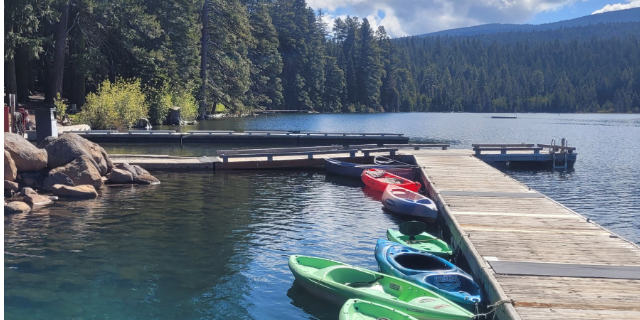Avista seeks to charge ratepayers for litigation challenging ambitious climate plan
Published 5:00 pm Friday, July 7, 2023

- Avista Utilities is fighting a state climate plan and may recoup its legal fees from gas customers.
Avista Utilities, the Rogue Valley’s natural gas company, has spent more than $51,000 on litigation opposing the Climate Protection Program, Oregon’s ambitious plan to cut carbon emissions by 90% over the next three decades.
The company is looking to recoup that money, and it may come from ratepayers.
The figures came to light in written testimony that Climate Solutions and the Sierra Club — two environmental nonprofits — submitted online Friday to the Oregon Public Utility Commission.
Avista is seeking permission from the commission to raise rates on customers by about 8%. Last year, the company raised rates 18%.
Acting as intervenors in the ratemaking case, the nonprofits — represented by Earthjustice, which specializes in environmental law — requested information from the company to find out what it wants customers to pay for.
They asked Avista to “provide any spending on litigation challenging Oregon’s clean energy statutes or regulations in the past five years, and any expected litigation expenditures going forward.”
While Avista said it “cannot speculate on the level of future expenditures related to issues included in this request,” the utility disclosed it had spent $51,951.13 at two firms “in connection with the CPP litigation”:
• $40,771.91 ($40,262 in fees, $515.91 in costs) to Baker Botts, a California-based law firm
• $11,179.22 ($10,983.04 in fees, $196.18 in costs) to Snell & Wilmer, a firm headquartered in Phoenix, Arizona.
Avista said the company seeks to recover the costs from ratepayers.
“And our understanding is, they’re going to continue spending ratepayer money to keep on challenging (the CPP),” said Noelia Gravotta, an Earthjustice attorney.
The outlays come from an ongoing lawsuit that Avista and the state’s two other natural gas companies — NW Natural and Cascade Natural Gas — filed in the Oregon Court of Appeals in March 2022 to oppose the CPP, which had recently gone into effect.
The plan — ordered by former Gov. Kate Brown, devised by the Oregon Department of Environmental Quality and approved by the Oregon Environmental Quality Commission — established a cap-and-trade system to scale back fossil fuel emissions that play a role in climate change.
In defense of the CPP, Greer Ryan, a clean buildings policy manager with Climate Solutions, said in the testimony: “Climate change is the defining environmental challenge of our time. In Oregon, the effects of a warming planet are clear. Our state faces increased wildfire danger, increased drought, reduced snowpack, reduced water supplies, and a rising ocean, all of which disrupt the daily lives of Oregonians across the state. Those effects — while widespread — do not impact the state evenly. Often, they disproportionally affect communities that are already disadvantaged.”
The gas companies have called for a judicial review of the program and questioned the state Department of Environmental Quality’s authority to execute it.
Greg Hesler, Avista’s senior legal counsel, said in a statement to the Rogue Valley Times, “Avista does not believe that the Oregon Climate Protection Program provides a constructive pathway for reducing emissions, and that it negatively impacts our customers through reduced energy choice, higher costs and decreased reliability. We also believe that natural gas plays a key role in reducing carbon emissions, particularly when used directly by customers in their homes rather than used to generate electricity to meet the same need.
“While we engaged in the rulemaking process in an effort to shape a policy that would effectively move us towards lower emissions while still maintaining affordability, choice and reliability for our customers, the CPP does not reflect our feedback or collaborative efforts. We believe it is a detriment to our customers, and, consequently, we joined several others in challenging the authority of the Oregon DEQ to enact and enforce the CPP. We believe it is a prudent expenditure on behalf of our customers, and it is therefore included as a cost to customers in their rates.”
It is not illegal in Oregon for utility companies to charge ratepayers for litigation.
The intervenors argue that it is inappropriate. They hope to persuade the commission to prohibit these costs — to make shareholders rather than ratepayers foot the bill.
Utility companies often directly, or through trade associations like the American Gas Association or the Northwest Gas Association, engage in lobbying and litigation to challenge laws and submit comments to regulatory commissions. The companies’ political and promotional activities don’t always get classified as lobbying and sometimes become part of normal expenses that get recovered in ratemaking proceedings and billed to ratepayers.
“(T)he way utilities have been accounting for political spending is something that utility commissions and legislators are grappling with across the country, because utilities have been attempting to charge ratepayers with a variety of expenses that are political in nature and counter to the public interest,” Gravotta said in an email.
“Utilities have essentially been taking advantage of some ambiguity in what might be defined as ‘political’ and also taking advantage of the opaque nature of utility proceedings and their own accounting worksheets.”
She noted that some state legislatures — such as in Colorado, Maine and elsewhere — have started enacting laws to prevent utility companies from engaging in this behavior. Oregon has yet to do so.
“But existing policy, including past Oregon PUC decisions, indicates that these expenses shouldn’t be charged to ratepayers,” she wrote.
It is important to highlight ways customers are asked to pay for things they may not know they are paying for, Gravotta said in an interview.
“They think they’re paying for heat and electricity,” she said. “Well, maybe they’re also paying for litigation to undermine public health and climate protections. Maybe they’re being asked to pay for promotion and misinformation about ‘how clean,’ or ‘how renewable,’ or ‘how green,’ or whatever’s going on with gas.
“And we really think that there needs to be more oversight — there needs to be kind of more sunshine on this issue. And so we hope that this is a part of a bigger conversation about what natural gas utilities are trying to make customers shoulder.”
The city of Ashland, following other Oregon cities, has taken steps to eventually eliminate natural gas in new residential buildings, with an eye toward doing the same in commercial and industrial buildings, as well as in remodeling projects, The Oregonian reported.






